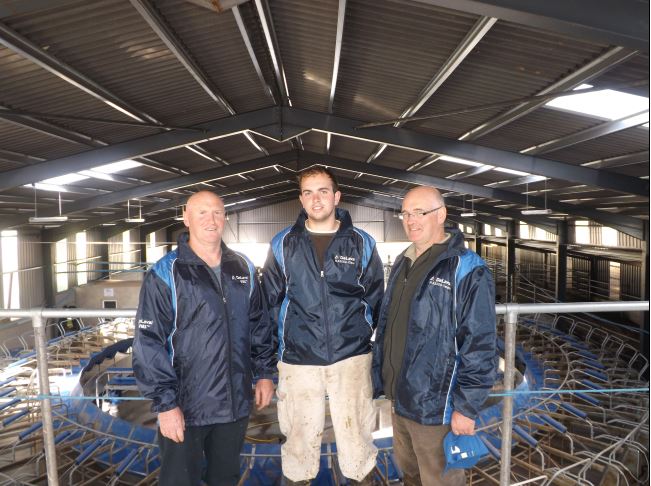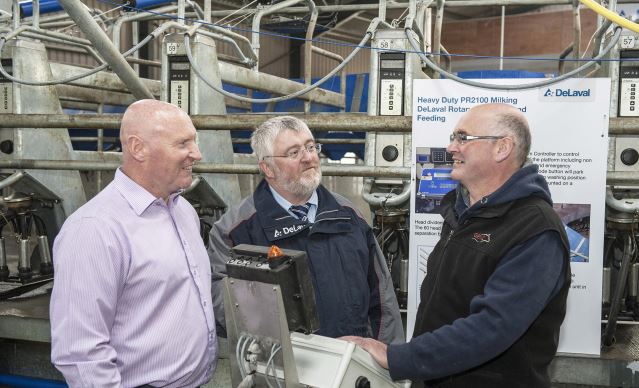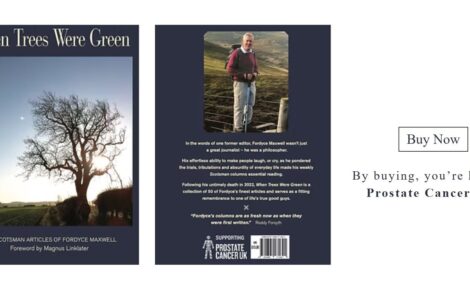



Ireland's Dairy Story: Expanding Sustainably
Expansion is on the cards in Southern Ireland, but for a County Cork family almost doubling farm output does not mean doubling the negative impact of their holding.Brothers Tom and Mike Dunne are gearing up their spring calving herd of Norwegian Red x cows for a new era in dairying, but are doing so with a system that is easier on the environment and man hours.
Already having leapt from 200 to 300 head, the Dunne’s farm at Downing, Kilworth, County Cork will reach 350 after quotas are removed.
This is not expected to be an issue, with a new rotary parlour that cuts down 30 per cent on water and detergents and five hours off labour.

The brothers are members of the Teagasc Kilworth discussion group and a local buying group. They are also members of the Teagasc DairyMis group in Moorepark.
Tom is active in the IFA (former Chairman of their Environmental committee) and is also a member of the European Dairy Farmers club. “I like to travel around Europe, meet other milk producers and check out their production systems.”
About 10 per cent of the land is reseeded every year and they have been using hybrid varieties. They make 350/400 acres of silage over the season and have all their own machinery.
Plan to Increase Milk Yields & Herd Size After 2015
Average milk yield at present is around 5,000 litres and they feed around 450 kgs of dairy nuts/cow. Tom and Mike plan to increase yields to 6,500/7,000 litres and feed up to one tonne of concentrates when quota is no longer a problem and this of course is subject to feed/milk prices.
Our aim, says Tom, is to have, “easy to manage, fertile cows with a medium level of production and ideally produced 80 per cent from grazing.” This farm is a two person operation most of the year and the brothers want to enjoy a good quality family lifestyle hence this investment in a new rotary parlour to reduce the milking time and labour required.

They supply 1.1 million litres at present but are restricted by quota so they hope to increase milk production to two million litres in due course. Most of the bull calves are sold off before they are two weeks of age. A small number are kept for breeding and sold to local farmers when they are around one year old.
The cows were originally British Friesian with some Holstein blood but over the last 16/17 years they have been using Norwegian Red semen and they do all the AI work themselves
Tom “likes the Norwegian Red breed because they have good health and fertility, are very fit as they have lots of walking to do and they also have a good milk yield.”
Hi Tech Plant & Equipment
The new 60 Point DeLaval PR 2100 (Parallel Rotary) was commissioned in February 2014 and features a unique design of concrete platform which has a low bail divider design to ensure easy cow entry and exit which improves cow flow and animal comfort.
This can be worked by one operator so Tom says “This is a significant saving on labour and time. The extra cost over a herring bone type of parlour is not significant when you consider the long term labour and time savings.”
We got advice from Teagasc and farmers and the consensus was that once you went over 250 cows a rotary parlour was the only practical option.” Mike and I looked at lots of parlours and spoke to the farmers milking the cows to get their feedback. Our old parlour was a DeLaval and we were very happy with the technology and service so these were important considerations”.
The equipment in this Hi Tech plant includes Auto cow ID, an ACR (auto cluster removal) system, MM27BC milk meters, MP 580 Alpro herd management system and Harmony light weight clusters.
The new DeLaval MM27BC milk meters are highly accurate, ICAR approved and also monitors any blood traces in the milk, conductivity, kick-off and air entry in the liners.
Milk flow is measured with infrared light technology. There are no moving parts to restrict flow and a minimal risk of breakdowns. The four red digits on the screen can be read clearly from a distance.
Other accessories include DeLaval in parlour feeders and retention bars. There is also a computerised feed to yield system and the DSG3 drafting gates for both entry and exit which makes sorting cows for AI work, dosing, tagging, vaccination, veterinary attention etc a cinch.
They can also sort slow milkers and use these smart gates to divert teaser bulls from the milking herd.
Tom says “the new plant is far less hardship for man and beast. Our herd is healthier and lameness is far less of a problem so cows should last longer.”
Mike agrees and points out that “cows are not waiting hours in the yard so they have a lot more grazing time.” Another bonus is a cleaner yard with less slurry to clean up.
More Cows Milked-Less Time and Labour Required
Tom says “we are saving over five hours a day and it’s very labour saving. This allows Tom and Mike more time for herd and farm management as the hi tech equipment makes this system perfect for a one person operation.
In the old parlour you really needed two people most of the time. It was taking up to 3.5 hours twice a day to milk cows and there was too much pressure on whoever was doing the milking.” Now the cows are milked in 50 to 60 minutes depending on stage of lactation and the actual herd size. Tom reckons that their new parlour can milk 350/360 cows per hour so he is a happy customer.
According to Steve Sefton, DeLaval Sales Director “We are delighted with our recent Rotary Installations we now have some of the best installations in the world”.
He points out DeLaval has been building Rotary milking parlours since 1930 but this modern design meets the exact requirement for larger expanding herds with sizes from 30 to 80 point parlours.
Mike says “the new parlour is bright and clean –a much better working environment, milking is a pleasant operation, animal comfort is greatly improved, cows come in much quicker and spend far less time in the collecting yard.
Eco Friendly Systems
The Hygenius C200 auto plant washer uses 30 per cent less water and detergents to clean the parlour and equipment. As Tom says “just push a button and walk away –when you come back after a tea break the plant is spotless.” The Hygenius also has automatic dosing while the detergents and descaler used are pre-programmed.
In addition they have installed a massive 32,000 litres DeLaval DXCEM bulk tank with a heat recovery system. It can hold up to three days milking. This tank cools the milk quickly to the ideal temperature. This super-sized tank can be washed in only 20 minutes using the eco-friendly and cost effective Hygenius automated tank cleaning system.
The parlour equipment includes two variable speed pumps, three phase electricity and a backup diesel generator (50 KVA). These pumps use 40 per cent less energy and are much quieter than conventional pumps. They are totally oil free except for a small quantity used in the gearbox so there is no polluting of the environment. These pumps are totally oil free except for a small quantity used in the gearbox so there is no chance of polluting the environment.
Direct -drives eliminate the worries associated with belt -driven pumps. Operation is more precise and tolerances are reduced, to give a smoother running with less oil consumption. You never experience vacuum fluctuations caused by loose fitting, poorly aligned transmission belts and you never have to adjust or replace them.
Great Service & Its Local
Tom and Mike were impressed by the service available from Tom and Brian Harte their local DeLaval dealer. According to Tom “we get a great service from their service team-this was one of the most important factors in deciding to purchase a DeLaval parlour.” According to Steve Sefton , the DeLaval Sales Director “ we have been servicing milk producers in Ireland for over 60 years and our dealers have an excellent local track record.”
Tim Hussey the DeLaval Territory Manager, says that DeLaval has a world class reputation for innovation, reliability and a wide range of experience so farmers know they are making a wise decision by investing in this brand. He says that “farmers notice that the 2x 2 pulsation system and lighter Harmony clusters are very gentle on the cow’s udder and teats.”
Incidentally the Harmony heavy duty MC93 clusters are designed for a long and trouble free life. Tim says if the operator has to lift the cluster 600 times a day it is a great help if they are lightweight. So no wonder dairy farmers like the Harmony clusters.


